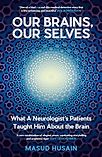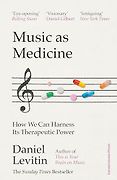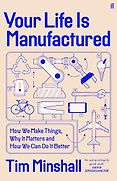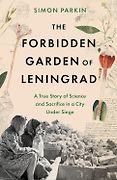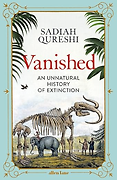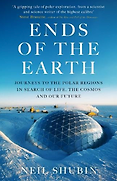You chaired the judging panel for the 2025 Royal Society Book Prize. What were you and your fellow judges looking for when you selected the best new popular science books?
There are so many good science books that it was really, really difficult. We were looking for books with interesting, solid, well-researched science, but which were also incredibly readable. You want a book that a reader will come away from having learned something new about science, but also that they had a good time reading that book. So it’s about learning and pleasure being mixed into one, and the product being something that you perhaps want to read again.
It does seem that there are different flavours of intelligence. One being what it takes to make a brilliant scientist, and another being able to communicate clearly those complex ideas.
Yes. Not all of the books on our shortlist are actually written by scientists; some are by science writers or journalists. But whichever side of that spectrum you sit on, you need to be able to put yourself in another person’s shoes to be able to tell a story in a compelling way.
That makes sense. Shall we look at the shortlisted books in turn? Let’s start with Our Brains, Our Selves: What a Neurologist’s Patients Taught Him About the Brain. Will you talk us through the book and why the judges admire it?
Well, I mean, just look at the title! What sort of doctor talks about what they’ve learned from their patients rather than what they’ve told them? That, for me, is a thumbs up.
And the book in its entirety is a beautiful exploration of how problems in our brains can cause us to change. Its about the concept of ‘self’ and how pathological problems in the brain can cause people to become completely different, and therefore be rejected by society.
It’s a very empathetic book, told in a wonderful way, and from a very personal perspective. You see this is a doctor who feels very much for these people.
These feel like profound questions. If you suffer brain damage or a neurological condition, and your personality changes as a result, are you still ‘yourself’? And if not—who are you?
Exactly. And the at the end of the book—well, I shouldn’t spoil it.
Spoil it if you like.
I won’t. But I can say it starts and ends with histories of two different patients that force us to think about self, and what ‘belonging’ means to us both as people and as members of society.
Fascinating. The second book on the shortlist is Music As Medicine: How We Can Harness Its Therapeutic Power by Daniel Levitin. Would you introduce it?
Levitin is also the author of a book called This is Your Brain on Music. He’s a researcher, a musician, and a scientist. So he’s an interesting person with a very varied perspective. A lot of this book is about how music influences the brain, and how music can be used to treat neurological issues.
Right, he talks about music being used in the treatment of multiple sclerosis and Parkinson’s Disease.
Yes, it talks about particular kinds of music that seem to work. It’s not all classical music; there’s also music by Beyoncé and a whole bunch of other things. One of the real messages that comes from this is that there is no one-size-fits-all. Music as medicine is highly personal. Something that works for you might not work for your wife, your brother, your sister, your child. There are certain things about every person’s brain that work in particular logical and electrical shapes. So how this work depends on the individual.
Do we have a sense of how this works, or just that it does work?
He cites a lot of recent research—a lot of it from his own lab—about how this works in the brain, and what kinds of areas of the brain are stimulated or talking to each other while listening to music. Some of it is correlational, but I think there’s more than correlation here. There’s some very good science and experiments with different sets of people, looking at control groups.
Music is meant to stimulate your brain. I’m sure you’ve heard of ‘Mozart makes your kids smarter.’ This is deeper than that. He goes into how these things work, and the details of the actual studies themselves, not just reporting the results.
The third book on the shortlist is Your Life is Manufactured: How We Make Things, Why It Matters, and How We Can Do It Better by Tim Minshall.
This book is amazing! I’ll never look at a tea kettle in the same way again, ever. Or toilet paper, for that matter. It’s an extraordinary book about how much we depend on systems we don’t see for the everyday things that we do.
We all know from the Covid pandemic how supply chains can be disrupted. Minshall goes through quite a few different supply chains, showing how intricate some of these things are, and how easy it is to disrupt them. But he also talks about how we can solve some of these problems, by making things closer to home, or taking a more robust approach to manufacturing.
I think that’s a great thing about—well, all of these books, but this book in particular—is it makes us think about what we can do next. What can we do to make our world sustainable?
It seems that the answer to that question, and questions like it, is going to be in the nuts and bolts, the practical elements of how the world works.
Extremely practical. But the answer lies with us as well. We, as consumers, and all of us are consumers, hold the key to this.
Shall we talk next about The Forbidden Garden of Leningrad by Simon Parkin?
This book made me cry! I’m a botanist myself, so I’ve known the story of the botanists of Leningrad for many years. But this is a beautifully told and brilliantly researched book about what happened to the world’s first seed bank during the Siege of Leningrad during the Second World War.
Leningrad was under siege for almost 900 days. In the first winter there was no food, and millions of people starved to death from this blockade. But the scientists who were looking after the seed bank protected the plant materials in the seed bank and didn’t eat them. They saved the seeds and tubers because they saw them as the future of agriculture.
There’s quite a lot about plant breeding in this book. About how we use wild species to improve our crops, which, actually, was in part started by Nicolai Vavilov, the plant scientist who founded the seed bank. He was imprisoned by the Stalinist regime and starved to death in prison. He was an extraordinary man, and apparently a very charismatic one, who was whisked away from a plant collecting expedition in the Crimea and put in jail.
“You cannot separate science from society. In 100 years time, someone will look back on and think—my goodness, why did they do that?”
This was a man trying to save Soviet agriculture, and the people who worked with him were also so dedicated to this mission that many of them died during the siege of Leningrad.
You know, the question I asked myself when I finished this book was: What would I have done? For me, the message of the book is that science is full of leaps of understanding, but it is also full of moral decisions. And these decisions are not talked about so much.
The bit that made me cry came right at the end. There’s a table that goes on for several pages with the names of all the people who worked at the institute during the siege and what happened to them. Some died of starvation, or from being shelled, or died on the front. Some people lived until the 1980s, so there was a lot of first-hand testimony.
I really loved this book.
That’s an interesting point. I read a lot about the evolution of ideas, but not so much about the messy reality of research. I suppose I must imagine scientists as functioning inside some kind of neutral white box, under stable laboratory conditions.
And scientists are often portrayed as only men! Great men making big decisions. But I think these are the people who should never be forgotten. They are not people who published a lot of papers, nor people credited with big discoveries. But they are the people who served this first seed bank that is the precursor of the Millennium Seed Bank at Kew and the Global Seed Vault on Svalbard, those places that are looking after seeds for future generations. Leningrad was the first, and it was saved due to the bravery, courage, and dedication of those people, many of them women—because the men had been sent to the front.
Our next book is Vanished: An Unnatural History of Extinction by the historian Sadiah Qureshi.
Again, this is a wonderful book. It looks at the idea of extinction, which we take for granted now, and at a time when extinction was first becoming something that people talked about—in the post-Darwinian age, when we realised that there were life forms on Earth that weren’t with us any more, and the discovery—although I hate the word discovery—of bones that didn’t match anything on Earth that they knew.
Those findings were revelations that made people rethink their relationship with the environment. She documents this in a compelling and very compassionate way. She also writes about its coincidence with the colonial project by European powers, and how this new paradigm of extinction, the idea of extinction, in a way made it okay for colonial powers to exterminate groups of people unlike them.
So the first half of the book is about people, and the second half of the book is about animals. There’s a bit about plants in there as well, which I really appreciate, because plants often get left out of the history of extinction. She has a very nice chapter about the Wollemi pine, which was found in a remote gorge in the Blue Mountains in Australia as a ‘living fossil.’
It’s a book about the ramifications of science together with colonialism and how those two things came together to create some of the problems we still have today.
New technologies and new scientific ideas seem to influence so much about how a culture looks at and interacts with the world. If the central model of the colonial era was competition and ‘survival of the fittest’, perhaps the central idea of today must be webs or networks, interconnection.
I think, for me, the thread running through all of these books is that you cannot separate science from society. That the decisions we make in the cultural milieu in which we exist, in 100 years time, someone will look back on and think: My goodness, why did they do that?
This brings us to our final book: Ends of the Earth: Journeys to the Polar Regions in Search of Life, the Cosmos, and our Future by Neil Shubin.
Yes, it’s a book about the poles. It starts off with him in an aeroplane. So you think it’s going to be a book about somebody jumping around the Antarctic and the Arctic looking for dinosaur fossils and having a lovely time. But in fact it’s a profound book about the effect that the two ends of the Earth—the polar regions—have had on global climate throughout geological history, and how change there today will seriously affect us.
I never knew how many kinds of ice there are! Ice that’s blue because it’s so compressed, that gets buckled up against mountains in Antarctica as ice caps move. That there are huge lakes under Antarctica which haven’t seen air for thousands or millions of years. And how, when an ice shelf breaks up, that happens from the bottom up, not the top down.
There’s a huge amount of science in this. He explains Milankovitch cycles, about warming and cooling cycles and its effects on human habitation and migration. About the influence of a warming Arctic on Arctic peoples.
So it’s a wide-ranging book. But, if I were to say what this book was about in one word, it’s a book about climate, and how climate influences everything.
I mean, there are dinosaur footprints too, and who doesn’t like a dinosaur?
If the idea of extinction shocked the Victorian scientific community, more recent generations have been just as horrified by the charting of manmade climate change.
I think so. But I think many of us—and I include myself in this—still don’t quite realise the effect that the poles have on climate, and have had throughout geological history. We’re talking about difference between a centimetre of ocean rise, or sixteen feet. That’s a big difference! A big difference for London, and for many places in the world.
I suppose it will be difficult to choose a winner.
I don’t actually look forward to this next stage. Well, I do, because I think when we chose the shortlist we had fascinating discussions about what we liked and disliked in books about science. What I’ve loved about the committee is that we are all real readers, and reading these books have made us ask questions about ourselves, and to consider things from supply chains to genocide in Tasmania to what it might mean to have a neurological condition that made us forget our pasts.
I’ve really looked forward to our meetings, and we have all been able to see the merit in not only the shortlisted books, but all those on the long list as well. There are books by first-time authors, books written by journalists and scientists who have written books before.
I guess I’d like to reiterate that one of the things that I think we saw in all of these books is that there are moral dimensions in scientific decision-making. Science is not in a glass box or an ivory tower, it is part of the society in which it occurs. Sometimes the decisions scientists have to make, or feel they have to make, are not easy.
Interview by Cal Flyn, Deputy Editor
August 15, 2025. Updated: December 12, 2025
Five Books aims to keep its book recommendations and interviews up to date. If you are the interviewee and would like to update your choice of books (or even just what you say about them) please email us at [email protected]
Five Books interviews are expensive to produce. If you've enjoyed this interview, please support us by donating a small amount.

